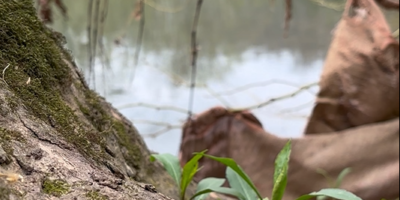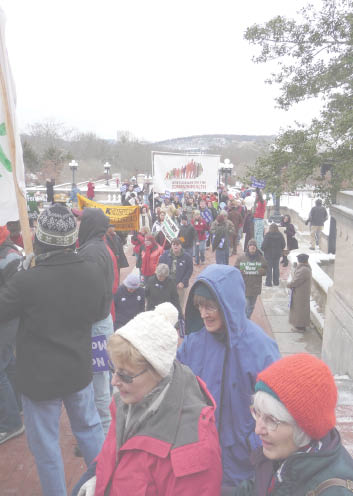A report on the gathering in Frankfort
By Austyn Gaffney
The social justice organization Kentuckians for the Commonwealth has a quote inspired by the cultural, economic and ecological impacts of mountain-top removal coal mining: “What we do to the land, we do to the people.”
In the past few years, the process of extracting coal through mountain-top removal has gained national attention, due to both the overwhelming scientific support of its devastating effects on the land and the grassroots voices arising in protest against it. Campaigners against MTR range from NASA climate scientist James Hansen and country singer Kathy Mattea, to farmer and writer Wendell Barry and the many individuals live within the mountains and along the rivers downstream.
The power of the people has always been pervasive in Kentucky, but the mechanization of mining that is destroying one of the most diverse ecosystems in the world, as well as an irreplaceable mountain culture of community, music, and folklore, has begun to unite our state like no other issue.
It was in this spirit of togetherness that over eight hundred and fifty people of all ages met in the state capital of Frankfort on Thursday, February 11th for the third annual I Love Mountains Day. Gathering by the river, organizers motivated the crowd with signs reading “Not One More Mile!” and “It’s Time for New Power!” Temperatures well below freezing and snow-covered streets did not dissuade the marchers, and at around 11:30 in the morning, the throng started their journey around the capital. People drummed in time with the marching footsteps and chants rippled through the crowd until soon everyone called in unison, “1-2-3-4 We don’t want coal no more, 5-6-7-8 Green jobs in this state!”
Reaching the steps of our state legislators, the chanting continued as the crowd were greeted by the string music of Nora, Ben, and Eli, and the firm voice of Teri Blanton, a KFTC member, who welcomed each actor in the battle to retain the remaining Appalachians. Sometimes referred to as the Erin Brockovich for social justice within the coalfields, Blanton has been a watchdog for the Environmental Protection Agency in Harlan County, advocating for the safety of headwater streams and the health of holler residents.
K.A. Owens, another member of KFTC and current chairperson was next to grace the podium, calling for “new political power, new clean energy power, and new economic power.” Next, Mickey McCoy, a teacher and organizer, demanded the marchers to spread awareness through every social outlet. “We must speak in our schools, our organizations, our churches, to friends and strangers. We must write our elected officials and letters to the editor. Blog it baby! Facebook it! And we must act. And today, you’re acting.”
Rounding out speaking duties were Nina McCoy and Jason Howard. McCoy spoke of returning to her eastern Kentucky home, while Howard asked the dissenters to raise some hell.
Following the speakers, the gathered crowd listened to some MTR-inflected music. Cellist Ben Sollee and musician Daniel Martin Moore premiered new songs from Dear Companion, an album inspired by mountain top removal mining and Appalac”hian heritage. Kathy Mattea, a country singer from West Virgnia, filled hearts with her song about the streams in Perry County.
Evidence of a growing youth power was on display throughout the day. Students Miranda Brown and Cari Moore spoke to the gathered crowd of the youth movement for change. The Kentucky Student Environmental Coalition (KSEC) held a meeting at the capital, and another youth-led delegation organized by KFTC asked to meet with Governor Beshear, though the governor did not make the meeting.
In Beshear’s place were two members of his energy cabinet, a woman from the Department of Natural Resources, and his Deputy Chief of Staff. Ranging in age from five to twenty-five, the twenty members of the delegation spoke of the science supporting the view that MTR diminishes biodiversity, pollutes thousands of miles of streams, and adversely effects both health and jobs within the region.
One of the youngest delegates, six-year old Makayla Urios from Pike County, brought in two bottles of yellow water to demonstrate why she felt sick after baths and the reason her parents had to purchase all their water instead of letting it flow from the sink. Although refusing to drink from the bottle themselves, the governor’s representatives agreed to bring the bottles to his desk and remind him of Makayla.
When questioned about the stream saver bills, including HB 396 and SB 396, the governor’s representatives could not give a definitive answer as to whether they would pass the house or the senate. They did not know how quickly renewable sources of energy would be generated within the Appalachian mountains, and whether they would support the clean-energy bill, HB 408.
I Love Mountains Day is just one example of the solidarity that can be seen within the state of Kentucky, and within the environmental movement especially. The inspiration from speakers, musicians, marchers, and youth has continued and reinvigorated the wave of momentum that will end the practice of MTR coal mining in eastern Kentucky, West Virginia, Virginia, and Tennessee.
Pair your feet with your voice, your mind and your compassion, and join the movement.





Leave a Reply